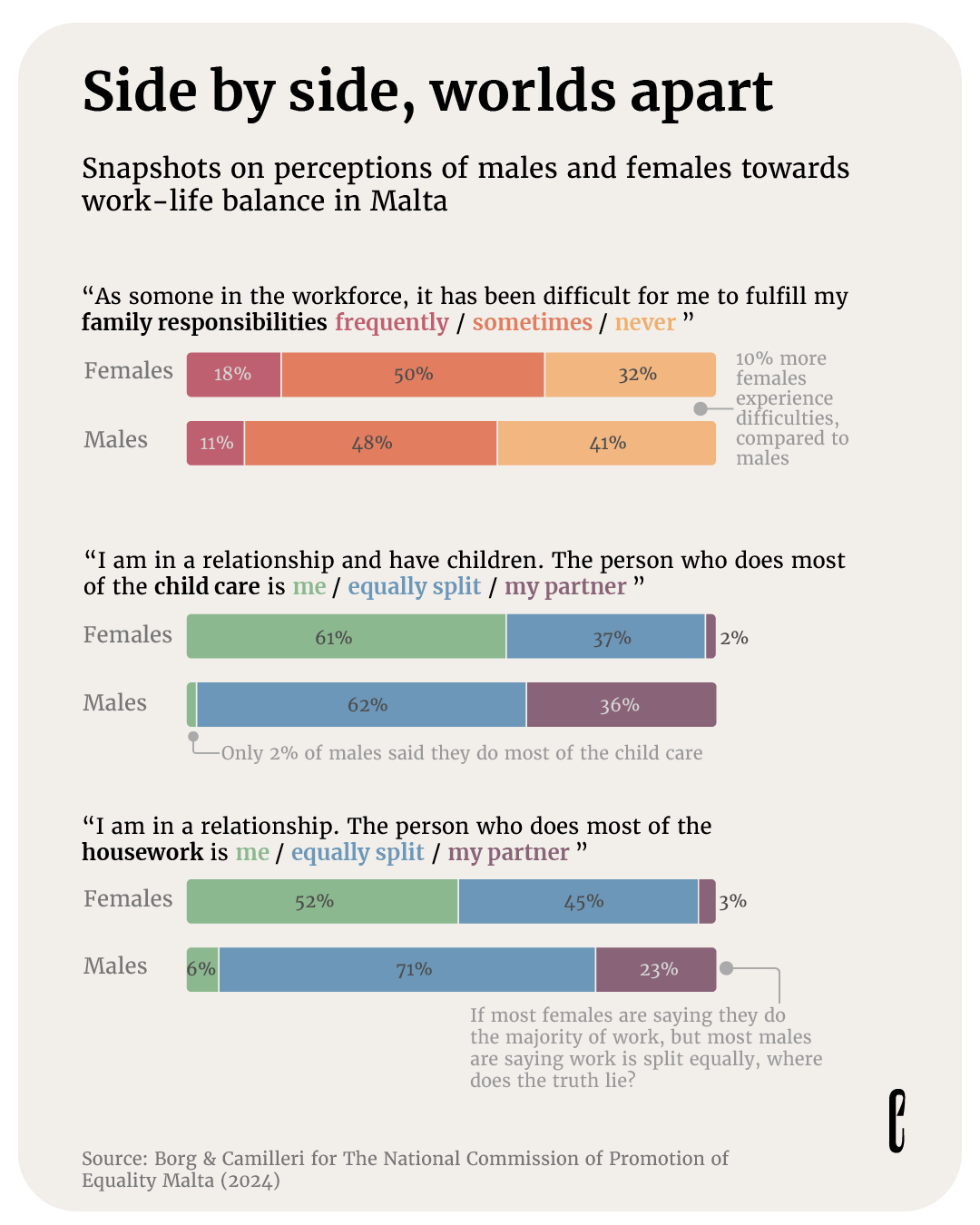When institutions failed Maltese women, 60,000 of them turned to Facebook
The European Correspondent - Jul 2025
This is my work, rooted in research and data analysis, for The European Correspondent. Looking for a similar investigation?
Get in touch, The Data Knitters is here to help.
“I think my boyfriend is monitoring my texts. What should I do?”
Every day, thousands of women in Malta ask questions like this in the Facebook group Women for Women (Malta). In a country of just 560,000 people, this group has amassed over 60,000 members, an impressive 26% of Malta's female population eligible for a Facebook account.
"It cuts across class, age, nationalities, and experiences," Elaine Compagno, general manager of the Women for Women Foundation which has been set up on the back of the Facebook group's success, proudly shares.
Over the past three months alone, the group has averaged 53 posts per day, generating more than 49,000 replies. This engagement level is the envy of most online communities, but behind the numbers lies a deeper question: why has this space become so vital
Women need a group to confide in
While one member attributes it to Malta's social fabric, others point to something more systemic. Malta lags just below the EU average for gender equality, excelling in education and employment, but has severe gender gaps in social participation and decision-making roles. Professor Brenda Murphy, who specialises in gender and media at South East Technological University, notes these scores remain reliable measures of inequality but may not capture the full picture of women's lived realities.
Stigma and isolation compound these issues. As one Facebook group member explains about Malta's abortion ban: "Imagine thinking you might be pregnant but you don't want to be. Who can you talk to?"
Francesca Fenech Conti, the group's founder, blames institutional failures. "(Politicians) cater to what they think we need, not what we actually need," she says, with Compagno agreeing: "If there was real political will, a much greater impact could be made."
It's not my group, it's our group
Women for Women (Malta) began when Fenech Conti sought support after a hysterectomy. She could not find it anywhere, so she opened this Facebook group. Now celebrating its 10th anniversary, she says, "it's not my group, it's our group." The Facebook space has evolved into a digital haven where members seek advice anonymously or under their proper name on everything from handling rebellious teenagers to being gaslit by doctors about women's pain to navigating divorce.
The issues discussed have remained consistent over the years, but awareness has grown. "For example, there are daily posts from women struggling from a lack of support at home and in the care of children from their partner," Francesca explains.
The community responds with support, debate, and practical guidance – mostly. Disagreements arise around hot-button topics like abortion, relationships, and parenting.
Some members find the strong opinions exhausting, while others are put off by oversharing and attention-seeking posts. Despite this, multiple interviewees said it's the only inclusive space in Malta's digital landscape.
Can these two things be true at once? Yes, because it remains a space where women can post about anything, Murphy explains, adding "we mustn't make the mistake of thinking Women for Women (Malta) has to be harmonious just because there's lots of women together."
Mirror of society
While many other European women's groups use top-down approaches, Women for Women (Malta) operates as a true peer-to-peer network. Admins intervene against hate speech and bullying, but advice stems from lived experience, not formal credentials. Research suggests people are more receptive to this support, though questions about the quality of advice remain.
One member confirms, "a lot of people feel very ready to give advice which is actually misinformed." Murphy doesn't see this as problematic because discussions tend to balance out thanks to experts among the membership.
Irrespective, the group has proven crucial for discussing sensitive topics and making difficult decisions toward fulfillment and independence. Even non-posters benefit, with one member sharing: "I learn from it, there are certain realities that make me aware of my privilege."
Vulnerable to the algorithm
In today's polarised social media landscape, this group has achieved something remarkable. Yet its existence is precarious due to reliance on Meta's platform, making it vulnerable to sudden rule changes.
The team is exploring alternatives and hopes to create real-world communal space. Plans are underway for a thrift shop this year, offering both support and a shopping experience.
The group was shut down once in 2016 – likely due to its involvement in the morning-after pill campaign, which was eventually successful. After a good cry, Fenech Conti wiped away her tears and set up the group again.
To infinity and beyond
Despite it not being her full-time job, Francesca remains a hands-on moderator and lifeline for urgent cases. Her phone constantly rings – a call came during our interview asking "I need to pay for my daughter's exams. Do you have €30 to spare?"
Admins regularly request small donations of €1–€5 from members, which add up significantly. A foundation was established to manage these funds and those raised by calendar sales, selling secondhand clothing, and events. There's also a storage unit stocked with essentials like nappies, pads, and shampoo, which is managed by volunteers and paid staff under Elaine's oversight.

